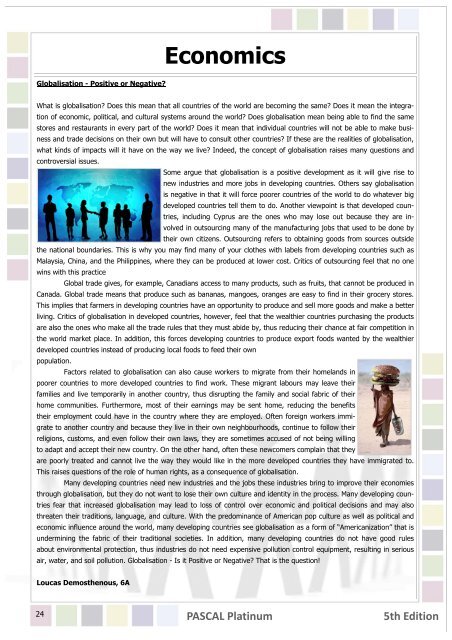PASCAL Platinum 5th Edition
PES_1010.pub (Read-Only) - Pascal Education
PES_1010.pub (Read-Only) - Pascal Education
- No tags were found...
Create successful ePaper yourself
Turn your PDF publications into a flip-book with our unique Google optimized e-Paper software.
Globalisation - Positive or Negative?EconomicsWhat is globalisation? Does this mean that all countries of the world are becoming the same? Does it mean the integrationof economic, political, and cultural systems around the world? Does globalisation mean being able to find the samestores and restaurants in every part of the world? Does it mean that individual countries will not be able to make businessand trade decisions on their own but will have to consult other countries? If these are the realities of globalisation,what kinds of impacts will it have on the way we live? Indeed, the concept of globalisation raises many questions andcontroversial issues.Some argue that globalisation is a positive development as it will give rise tonew industries and more jobs in developing countries. Others say globalisationis negative in that it will force poorer countries of the world to do whatever bigdeveloped countries tell them to do. Another viewpoint is that developed countries,including Cyprus are the ones who may lose out because they are involvedin outsourcing many of the manufacturing jobs that used to be done bytheir own citizens. Outsourcing refers to obtaining goods from sources outsidethe national boundaries. This is why you may find many of your clothes with labels from developing countries such asMalaysia, China, and the Philippines, where they can be produced at lower cost. Critics of outsourcing feel that no onewins with this practiceGlobal trade gives, for example, Canadians access to many products, such as fruits, that cannot be produced inCanada. Global trade means that produce such as bananas, mangoes, oranges are easy to find in their grocery stores.This implies that farmers in developing countries have an opportunity to produce and sell more goods and make a betterliving. Critics of globalisation in developed countries, however, feel that the wealthier countries purchasing the productsare also the ones who make all the trade rules that they must abide by, thus reducing their chance at fair competition inthe world market place. In addition, this forces developing countries to produce export foods wanted by the wealthierdeveloped countries instead of producing local foods to feed their ownpopulation.Factors related to globalisation can also cause workers to migrate from their homelands inpoorer countries to more developed countries to find work. These migrant labours may leave theirfamilies and live temporarily in another country, thus disrupting the family and social fabric of theirhome communities. Furthermore, most of their earnings may be sent home, reducing the benefitstheir employment could have in the country where they are employed. Often foreign workers immigrateto another country and because they live in their own neighbourhoods, continue to follow theirreligions, customs, and even follow their own laws, they are sometimes accused of not being willingto adapt and accept their new country. On the other hand, often these newcomers complain that theyare poorly treated and cannot live the way they would like in the more developed countries they have immigrated to.This raises questions of the role of human rights, as a consequence of globalisation.Many developing countries need new industries and the jobs these industries bring to improve their economiesthrough globalisation, but they do not want to lose their own culture and identity in the process. Many developing countriesfear that increased globalisation may lead to loss of control over economic and political decisions and may alsothreaten their traditions, language, and culture. With the predominance of American pop culture as well as political andeconomic influence around the world, many developing countries see globalisation as a form of “Americanization” that isundermining the fabric of their traditional societies. In addition, many developing countries do not have good rulesabout environmental protection, thus industries do not need expensive pollution control equipment, resulting in seriousair, water, and soil pollution. Globalisation - Is it Positive or Negative? That is the question!Loucas Demosthenous, 6A24<strong>PASCAL</strong> <strong>Platinum</strong><strong>5th</strong> <strong>Edition</strong>
















